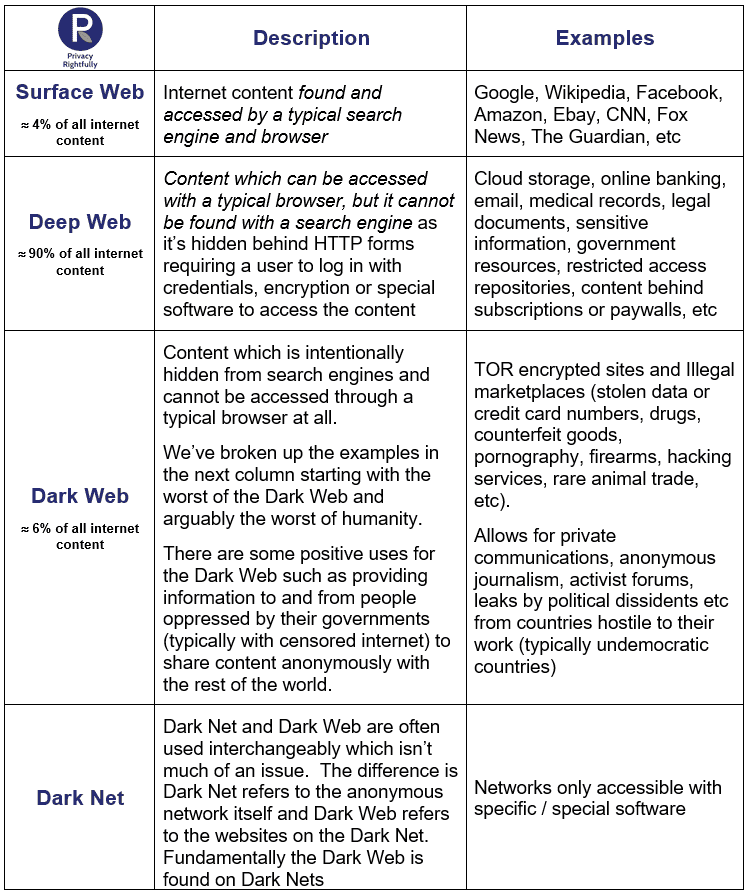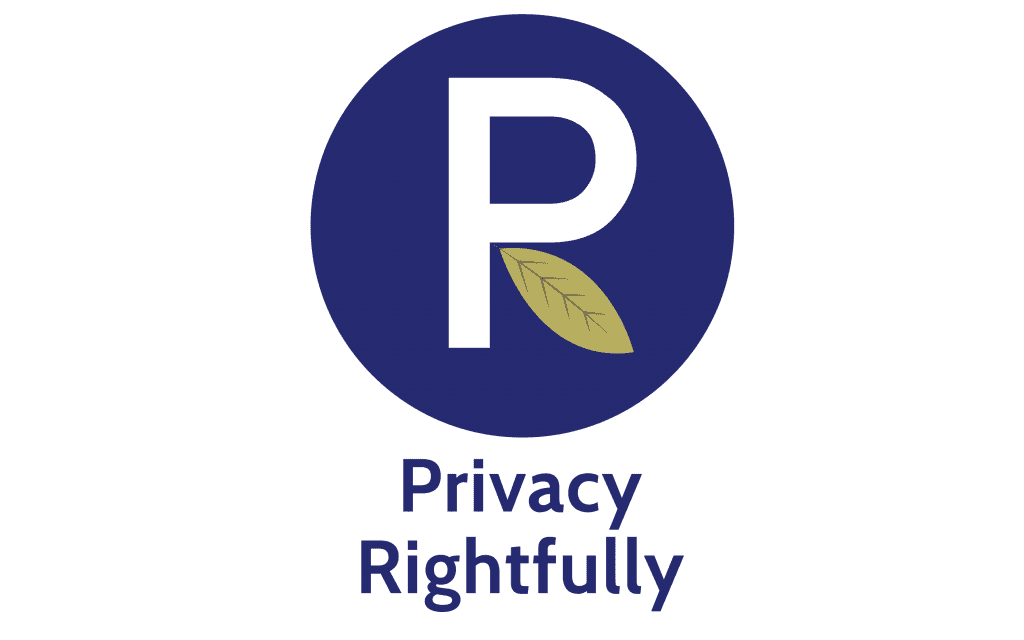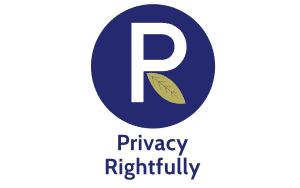Disclosure
Please note, this article does not provide instructions on how to access the Dark Net or Dark Web sites. Most of the content on the Dark Web is illegal or immoral as you’re about to find out and this isn’t something we approve of or promote access to. We are also intentionally not listing the names of any Dark Web sites or historical examples of their performance and seizure by law enforcement.
Introduction
This article will show the differences between four online destinations being the Dark Net, Dark Web, Deep Web, and Surface Web. We will discuss the purpose each one serves before focusing on the Dark Web and what is found on it. We hope by the end of this article you will be able to differentiate between the four terms and know what’s being spoken about they come up in media reports. We also hope this will bridge the gap between a data breach and the bad actor responsible receiving some fruits for their labour – how and where is illegally acquired data monetised.
Defining the four
We’ve put together the image below to illustrate the differences between the four terms.

We can also put this into a bit of an analogy to help consolidate the differences in your mind if you’re still a bit confused.
- Surface Web: Is like your house, visible from the street to anyone walking by or looking for it on a map (the map being a search engine)
- Deep Web: The contents of your house not visible or accessible from outside or to the public without a key to unlock your front door (the key being your username and password)
- Dark Net: This is the underworld of the city you live in, the underground network of shady characters, gangs, organised crime networks which most people know exist but don’t always know where. Those hiding from law enforcement and government authorities.
- Dark Web: These are the illegal products and services available for sale within these dark parts of your city. It’s the illegal drugs, pornography, prostitution, etc., sold by those shady characters.
The core difference between the Deep Web and Dark Web is purpose and ethics. The Deep Web is ethically neutral it can be used for good and bad, and its purpose is overwhelmingly a legal protection of sensitive content (such as your email account). The Dark Web is overwhelming immoral and illegal, and its purpose is to protect the identity of those partaking in illegal activities.
What are they used for?
The Surface Web is rather self-explanatory from the earlier image – it’s typically used to find publicly available information. The Deep Web is also easy to understand as having a layer of security before any content is accessible. It’s a necessity to allow for online banking, cloud storage, and email (to name a few) to be secure from public access – it’s why you lock your front door when you leave the house. If this content was on the Surface Web, it would mean anyone could use a search engine to find the contents of your emails, bank accounts, social media, or anything else you need a username and password to access.
When it comes to the Dark Web anonymity is the name of the game – users and owners of sites can withhold their identity and location, data can be transferred anonymously, and purchases are made with cryptocurrency. This is why it’s so appealing from criminals to whistle-blowers – they can conduct their business and simultaneously protect their identity to evade detection.
Here’s a list of what can be found for sale on the Dark Web:
- Illegal drugs, poisons, chemicals, and prescription medication
- Weapons and ammunition
- Pirated or illegal media and software (including various types of malware)
- Hacking services for hire (assassins for hire are rumoured to exist too but it’s widely believed these are a scam)
- Content depicting or promoting violence against certain groups and hate crime (racist, religious, homophobic, sexual abuse, physical abuse, etc). This also includes items such as Nazi paraphernalia and similar physical products not typically sold in public.
- Pornography, torture, and abuse of children, animals, and prisoners
- Hacked data and media (credit card numbers, sensitive government and medical documents, login credentials, nude photographs, competitor intellectual property, etc)
- Content to help facilitate crime or terrorism (how to build bombs, building plans and blueprints, 3D printing plans, how to commit certain crimes and not get caught, etc)
- Wikileaks documents
- Stolen or counterfeit merchandise (such as luxury brand clothing and watches), counterfeit cash in various currencies, counterfeit documents (such as passports, degrees, and various ID cards).
- Rare or endangered animals, human organs and body parts, equipment to enable crime (such as ATM skimmers, drug cooking tools and ingredients)
- Many other products, services, content and media along the same lines as what’s been listed so far
It’s worth pointing out that not all of the Dark Web is used for illegal or nefarious purposes. It serves as an avenue for free expression by people suffering under dictatorship, oppression, mass surveillance, or censorship. It allows for these people to share with the rest of the world what life looks like behind their boarders (via photos, videos, blogs, leaks, and activist journalism). However, such positives are a small part of the Dark Web, overshadowed by the horrendous majority.
Why aren’t Dark Web sites taken down by law enforcement?
They are. Every day many Dark Web sites are taken down but due to the anonymous nature of the Dark Net, getting to the people behind the Dark Web sites is more difficult. When law enforcement takes a site down, the owners just open a new one in its place.
How should I interact with the Dark Web?
You shouldn’t. Even if it is to satisfy your curiosity accessing the Dark Web without correct precautions can still expose you or your device and carry other risks. It varies between jurisdictions but in some countries just accessing the Dark Web is illegal and in others access is legal but browsing illegal services is illegal. Don’t forget if you do take part in purchasing from the Dark Web and buy a stolen mobile phone, for example, if that turns out to be a scam you have no avenue for recourse, no protection against being defrauded. Just stay away would be our strong advice. Don’t forget the vendors on the Dark Web range from opportunists to large scale crime syndicates – do you trust them with your address?
Precautions to take regarding the Dark Web
We are not listing precautions to take whilst ON the Dark Web, we’re not covering that because we’re not encouraging access to it as per our disclosure at the start of the article and our concluding remarks to come. Here is a list of things which reduce the risk of your data becoming available on the Dark Web:
- As you can see from what we’ve listed above as being for sale on the Dark Web, your fundamental precaution is to secure the credentials to your Deep Web accounts. Use strong passwords or consider a password manager, enable 2FA, and close down accounts you no longer use (don’t forget to request your data be deleted by the vendor first). Being conscious of and avoiding phishing scams is also important to protect your login credentials as is avoiding public / unsecured Wi-Fi networks to access your accounts from.
- You cannot control the security protocols of companies behind the various accounts you have, but you can sometimes control how much data you give them. This is important as a lot of data sold on the Dark Web is from large scale data breaches of large corporations. When opening accounts only complete the required information (don’t provide anything listed as optional) and consider using incorrect date of birth or address. Obviously, you need to consider if it is appropriate to provide incorrect information – you wouldn’t for opening bank account, with a government department, or anywhere that may send you mail correspondence or require ID checks. This is appropriate for more leisure accounts such as when you need to open an account to use the app which your new smart watch syncs exercises to, for example.
- Use a dedicated credit card with a modest limit for online purchases and debits (online shopping, streaming service subscription debits, etc). If that isn’t realistic for you, at least use a second account for transactions which isn’t your main account which holds your wages or significant savings.
- Many antimalware providers have an add on service (at cost), which monitors the Dark Web and sends you an alert when your data appears on the Dark Web for sale.
- Monitor data breaches with tools such as https://haveibeenpwned.com/
- Research companies and apps before opening accounts with them paying particular attention to their history of data breaches
- Secure your sensitive documents (scans of IDs, bank statements, medical records, photographs, etc) with an extra layer of protection such as an encrypted folder. Fundamentally don’t just leave such files sitting on the desktop of your computer.
Conclusion
The purpose of this article is simply awareness building, so you know what’s being referred to when you hear reports about the Dark Web. As someone interested in taking precautions to protect their privacy and security you should know about its existence and what goes on there. However, we have been careful not to promote it, give instructions how to access it, or list Dark Web sites or markets by name.
The main reasons it’s important to know about the Dark Web are:
- We often talk about bad actors stealing your data or credentials, this article aims to fill the gap of what happens next. We hope you can see what they do with it and how they manage to make money from it.
- It’s also worth knowing how the Dark Web has radically shifted illegal transactions and allowed for more ease and anonymity. The reason more people, especially young people, are able to access weapons or drugs is because they no longer need to know a certain contact. It’s no longer necessary to meet a drug dealer or similar shady character in a dark alleyway and risk physical harm and everything else that goes with partaking in illegal transactions face-to-face.
We support people being able to be use the internet in a way that is private, secure, and free from risks such as their identity, personal content, or sensitive information being breached. However, when you provide the highest level of anonymity possible coupled with human nature being what it is, you tend to find the highest levels of lawlessness.
The Dark Web does allow for some of the things we support such as people living under systems of oppression, censorship, mass surveillance, dictatorship and so on being able to tell the rest of the world about the injustices that are really going on beyond what the media reports. However, this is unfortunately such a small part of the Dark Web that it makes putting a positive spin on it virtually impossible.
We’ve written about our position on this before here, here, and here for example. We are not extremists with a disregard for the law, instead we’re focused on helping people, especially those less tech savvy, take precautions against being an easy target for a breach by a bad actor. Such breaches can cause financial, personal, reputational, career, and mental distress or loss. We are not helping people take precautions to help them alleviate the risks in making purchases of illegal products or services online.
Know about the Dark Web, know how cybercrime is monetised there, know that’s why you need to take the precautions we write about to protect your data ending up there. But stay off the Dark Web, no matter how curious you are, would be our strong advice.
This article is written in line with our Terms & Conditions and Disclaimer. As such all content is of a general nature only and is not intended as legal, financial, social or professional advice of any sort. Actions, decisions, investments or changes to device settings or personal behaviour as a result of this content is at the users own risk. Privacy Rightfully makes no guarantees of the accuracy, results or outcomes of the content and does not represent the content to be a full and complete solution to any issue discussed. Privacy Rightfully will not be held liable for any actions taken by a user/s as a result of this content. Please consider your own circumstances, conduct further research, assess all risks and engage professional advice where possible.

